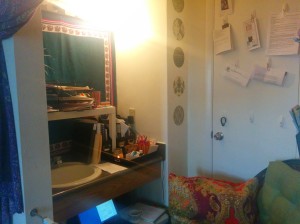In my modest town-home, off the master bedroom, is a nook, with a sink and a towel bar. At the opposite end of the nook entrance is a door to the bathroom, which itself is centered between the two upstairs bedrooms; there’s another door to the bathroom at the top of the stairs.
Since moving in, we struggled with a way to use the space effectively: at one point, it was a baby-diapering area, at another, it was a supplemental clothes closet. We have never used the nook as it was intended: who needs a second sink in their bedroom? Maybe people who shave or wear makeup–things Leif and I rarely do.
Finally, six months ago, I found a purpose for the room. In the sink I placed a Pothos plant. On the counter, a few magazine holders, stuffed with copies of Creative Nonfiction, The Sun, the Southeast Review, River Teeth. In front of that, a jar of pencils, some sticky notes, a candle. I pinned a scarf over the mirror covering the entire wall above the sink, and unscrewed three of the four vanity bulbs above it. I rigged file holders to the towel bar using wire twist-ties from bread bags. I flipped a closet rack upside town and mounted it as a book display shelf using cup hooks I screwed into the wall. I slid our camping cooler beneath the sink. I stuck an over-sized rattan chair in the nook, placed my tea on an overturned plastic file box, and voila! A writing space of my own. Virginia Woolf herself couldn’t have been more proud.
So this is where I sit, right now, writing this post. Ambient music floats up from my Pandora app, and the candle warms lavender oil, sending the calm scent into the air. It’s all very zen, very pleasant, very comfortable. It’s easy to assume that I would do all my writing here.
 But after investing so much time and effort into crafting a creative home for myself, I’ve realized that what surrounds me is far less important that what is within me. I only do about 30% of my writing here, while I do about 90% of my filing and paper-storing here. It’s nice to have just one place for things, to know that all my literary journals are here, to know that all my MFA paperwork is filed right there. It’s also nice to have a retreat from the bustle of children downstairs, now that we are keeping the baby home in an effort to save money.
But after investing so much time and effort into crafting a creative home for myself, I’ve realized that what surrounds me is far less important that what is within me. I only do about 30% of my writing here, while I do about 90% of my filing and paper-storing here. It’s nice to have just one place for things, to know that all my literary journals are here, to know that all my MFA paperwork is filed right there. It’s also nice to have a retreat from the bustle of children downstairs, now that we are keeping the baby home in an effort to save money.
But I don’t need a special space to be creative. Sometimes I do my best writing in a busy coffee shop. Or a bustling library vestibule. Or a darkened dive bar. In my children’s bedroom as they fall asleep, just because they want me there. It would be a tragedy if, because I created a sacred space, I came to depend on it, to need it, to be unable to create without it. In germinating my sacred space, I’ve learned that I don’t actually need it, the way I don’t actually need lots of things. The way I’ve learned that by holding onto things too tightly, I choke myself in that grip.
I’ve learned that, because I carry the sacred within me, the sacred surrounds me.
